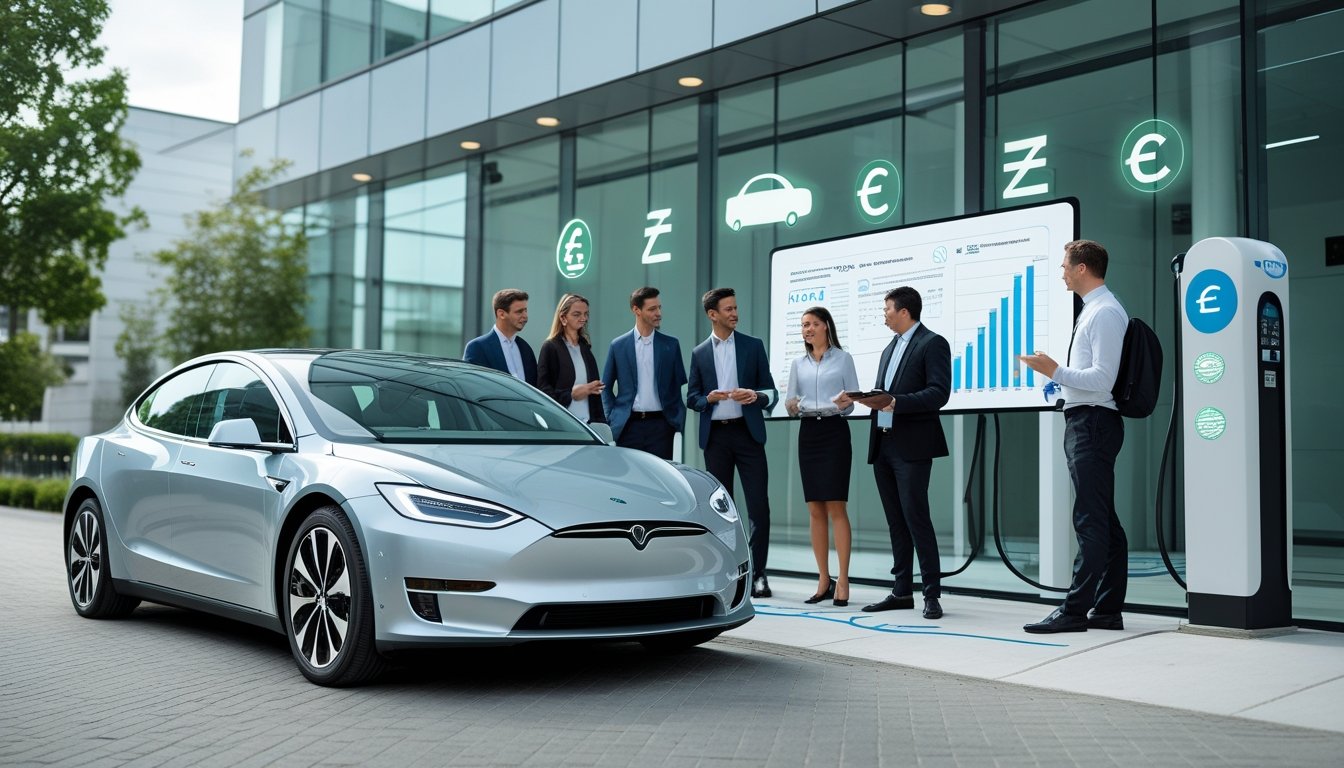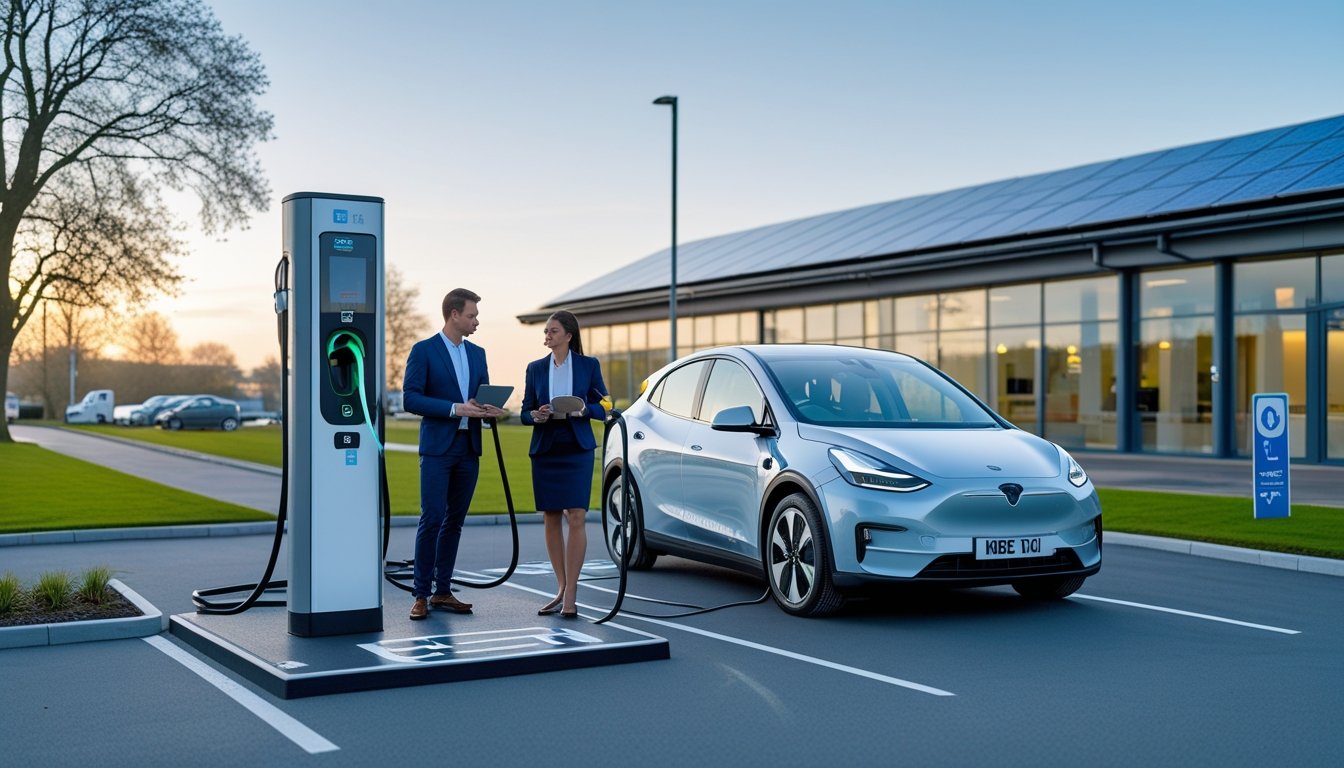Late updated: 16 Jun 2025 08:06
Written by: Amber Collins
Exploring Electric Vehicle Tax Benefits for UK Businesses: A Comprehensive Guide
Electric vehicles are steadily transforming the landscape of business transportation in the UK. Many companies are now considering this shift for their fleets, driven by a mix of environmental responsibility and financial incentives. One of the most compelling reasons to adopt electric vehicles as a business decision in the UK is the substantial tax benefits, which can significantly reduce operating costs.

UK businesses have access to various tax advantages when they incorporate electric vehicles (EVs) into their fleets. The Benefit-in-Kind (BIK) tax rate for fully electric company cars is remarkably low, making it attractive for both employers and employees. Additionally, businesses can recover a portion of the VAT on electric vehicles used for business purposes, further enhancing cost efficiency.
Introducing electric vehicles into a company's fleet is not only a step towards sustainability but also a strategic financial decision. As we explore these advantages, it is essential to consider practical deployment challenges and frequently asked questions to make informed choices.
Key Takeaways
- Electric vehicles offer significant tax benefits for UK businesses.
- BIK rates for electric cars are lower than for petrol or diesel vehicles.
- Deploying EVs requires understanding practical considerations and FAQs.
Key Electric Vehicle Tax Benefits For UK Businesses
Electric vehicles offer numerous tax opportunities for businesses in the UK. Reducing emissions and lowering tax burdens aren’t just added perks, they serve as impactful business strategies.
Capital Allowances and First-Year Allowances
When businesses invest in electric vehicles, capital allowances allow for tax relief on the investment. First-Year Allowances (FYA) provide an incredible opportunity: companies can claim a 100% write-off against taxable profits for vehicles with CO2 emissions of 50g/km or less. This significant incentive applies when a business chooses low-emission vehicles like electric cars or vans.
These allowances include both EVs and the infrastructure necessary for their operation, such as charging stations. Writing down allowances also apply, but the real financial advantage is with FYA. These incentives make investing in electric transportation a smart fiscal decision.
Benefit In Kind (BiK) Taxation
BiK taxation is crucial for businesses providing company vehicles. For electric vehicles, the Benefit-in-Kind (BiK) tax is substantially lower compared to petrol or diesel alternatives. In the tax year 2024/25, zero-emission cars have a BiK rate of just 2%.
This low rate can lead to considerable savings for both businesses and employees using company electric cars for personal use. It represents a tangible cost reduction in employee tax liabilities, motivating a shift towards low-emission and zero-emission vehicles.
VAT Recovery and Reductions
VAT recovery is another compelling factor. When purchasing electric company vehicles, businesses can reclaim VAT, provided that there is some business usage. Input VAT can be fully recovered on vehicles used solely for business purposes, which includes electric cars and vans.
Furthermore, installing workplace charging facilities entitles businesses to reclaim VAT, further diminishing expenses. This creates an advantageous environment for companies to expand their EV fleets while minimising tax burdens.
Grants and Government Incentives
The UK government offers various grants to stimulate electric vehicle adoption. The Plug-in Car Grant supports businesses by reducing the purchase price of eligible vehicles. Grants for home and workplace charging infrastructure (e.g., Workplace Charging Scheme, EV infrastructure grant) also alleviate setup costs.
These schemes enhance the financial attractiveness of switching to an electric fleet. For businesses interested in sustainability, these government incentives lower the barriers, making electric vehicles an economically viable option.
Practical Considerations For Deploying Electric Vehicles In UK Businesses

Deploying electric vehicles (EVs) in UK businesses involves understanding the nuances of acquisition options, establishing a robust charging infrastructure, and managing accounting records effectively. Each aspect can significantly impact the financial and operational efficiency of incorporating EVs.
Leasing Versus Outright Purchase
When deciding between leasing and outright purchasing EVs, businesses must weigh initial costs against long-term financial benefits. Leasing through operating leases or hire purchases can offer flexibility and lower upfront costs, making it attractive for businesses looking to manage cash flow. Leasing also typically includes maintenance in the monthly fee, freeing us from unexpected repair costs.
Outright purchase, on the other hand, allows us to claim capital allowances such as the 100% First Year Allowance. This can be a decisive factor for businesses aiming to reduce taxable profits. We also gain full ownership, providing more freedom in vehicle usage and resale advantages. The choice between leasing and outright purchase should consider the operational demand and financial strategy of the business.
Charging Infrastructure and Associated Grants
Implementing charging infrastructure is crucial for EV deployment. Installing electric vehicle charging points at business locations or offering home charging point solutions for employees reduces reliance on public charging networks. Our planning should account for the charging costs and potential funding from government grants.
The UK government offers incentives like the Workplace Charging Scheme, which provides financial support for installing up to 40 charging sockets. These grants cover a portion of the installation cost, making it more financially viable. Considering the EV's electric range and charging requirements is critical to choosing the right infrastructure setup.
Accounting and Record-Keeping For EV Use
Efficient accounting practices are essential to managing EVs as business assets. Keeping detailed records of business mileage and distinguishing between business and private use is necessary for accurate tax reporting and mileage allowances. The Advisory Fuel Rates for EVs differ from those for petrol or diesel cars and need precise documentation for compliance with HMRC regulations.
Categorising charging costs as a business expense can provide additional tax benefits. We must also track the electric range and performance to ensure operational effectiveness. Implementing a systematic approach to record-keeping ensures we remain compliant while optimising the cost benefits associated with operating EVs in our business.
Frequently Asked Questions

As electric vehicles become more appealing to UK businesses, it's crucial to understand the tax benefits available. We address common questions that businesses and sole traders have regarding tax incentives and obligations for electric vehicles.
What are the tax incentives for purchasing electric vehicles for a limited company in the UK?
Limited companies can benefit from 100% First Year Allowances when purchasing new electric vehicles. This means the entire cost can be deducted from taxable profits in the year of acquisition, significantly reducing tax liability compared to traditional vehicles.
How can a sole trader benefit from tax deductions when acquiring an electric vehicle in the UK?
Sole traders may claim capital allowances on electric vehicles. This allows a portion of the vehicle's cost to be deducted from profits. Additionally, running costs, such as charging, may also provide further tax relief.
What is the expected company car tax for electric vehicles in the UK for the year 2025?
From 2025, electric vehicles will be subject to road tax. The company car tax rates for electric vehicles are expected to be favourable compared to petrol or diesel vehicles, offering long-term savings for businesses.
How does Benefit in Kind tax apply to electric vehicles used by businesses in the UK?
Electric vehicles offer preferential Benefit in Kind (BiK) rates. This reduced rate is designed to encourage businesses to adopt low-emission vehicles, leading to lower personal tax bills for employees.
Are second-hand electric vehicles eligible for tax deductions when purchased by UK companies?
Second-hand electric vehicles do not receive the same 100% First Year Allowance as new ones. However, they may still qualify for the standard Writing Down Allowance, providing some tax relief.
Which electric vehicles are eligible for 100% tax deductions for businesses in the UK?
New electric vehicles purchased by businesses qualify for 100% First Year Allowances. These must be brand new and unused to take full advantage of the tax deduction in the year of acquisition.
